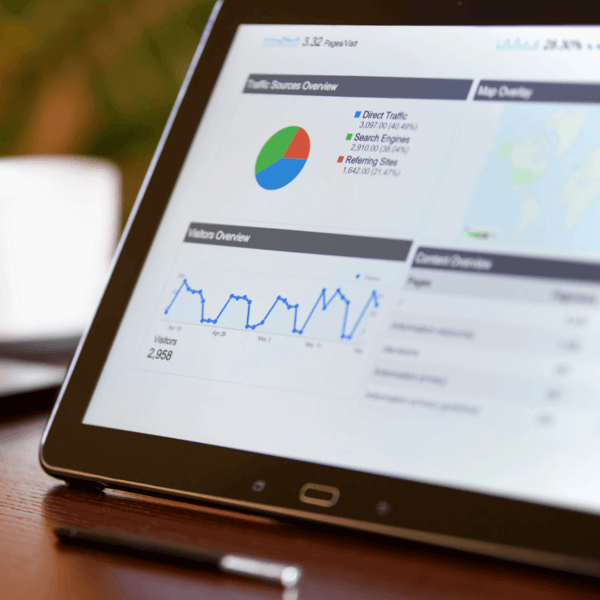Unlock AI Marketing: Top 10 Tools, Pros & Cons for 2025
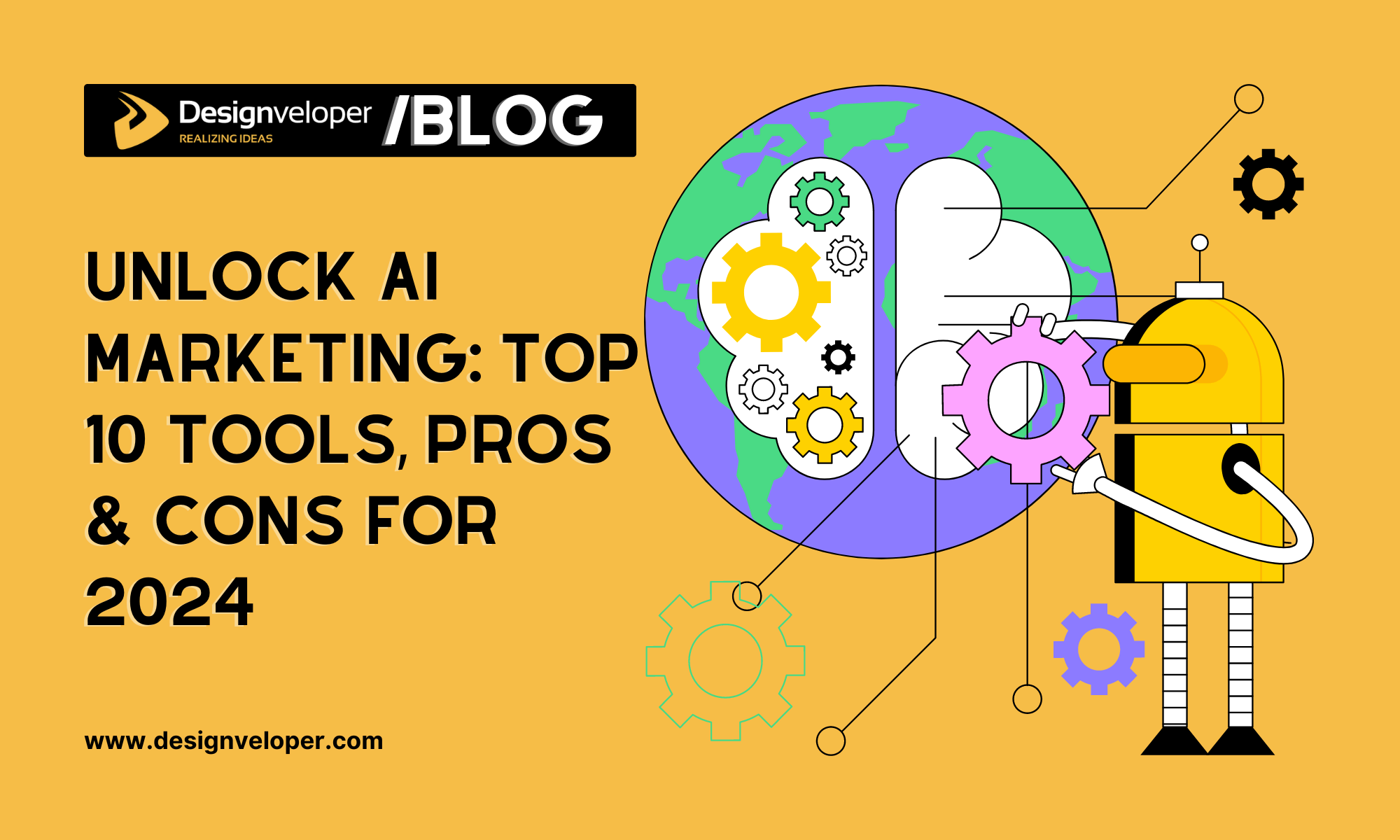
Techs are fast evolving and everyone is going digital. This makes standing out online harder than ever, with companies battling intensely for the audience’s attention. That’s why many more marketers are turning to AI marketing tools as their secret weapons to stay competitive.
But what are the pros and cons of using AI in marketing? What are the best AI-powered marketing tools you should consider using? Let’s find the answers in this guide.
Understand AI in Marketing
First, we’ll delve into the application of AI in marketing.
What is AI in Marketing?
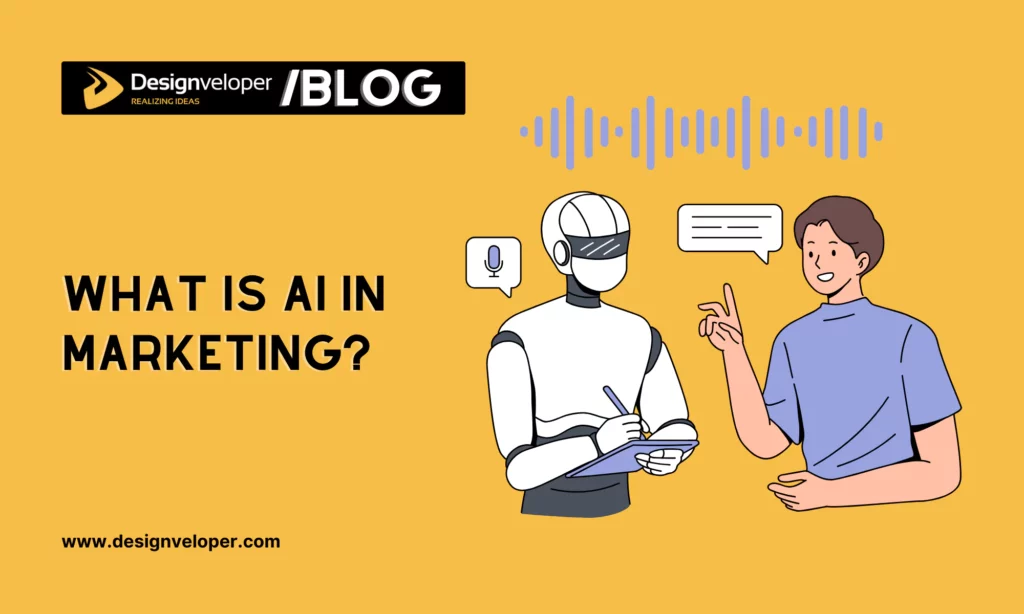
In both traditional and digital marketing, Artificial Intelligence is widely adopted to analyze data, automate tasks, and customize end-user experiences.
For example, previously, crafting personalized email sequences for each target customer could consume countless hours. This was not only time-consuming but also daunting and possibly inefficient.
Further, delays in dispatching these emails might compromise the customer experience. This even advertently gives competitors the opportunity to captivate your audience. This is where AI steps in, streamlining your email marketing campaign and giving you a competitive advantage.
In particular, AI can analyze vast amounts of data to uncover hidden patterns and customer insights. Then it can tailor email content that fits your target audience.
The same also applies to other marketing aspects like social media management. As AI marketing tools are evolving, they’ll continue transforming the way you connect with customers.
Pros & Cons of AI in Marketing
Today, more than 60% of marketers have leveraged AI tools in their marketing tasks. While AI provides a multitude of notable benefits, it’s important to understand its limitations to your marketing effort as well. Let’s dive into the pros and cons of AI in marketing:
5 Pros of AI in Marketing
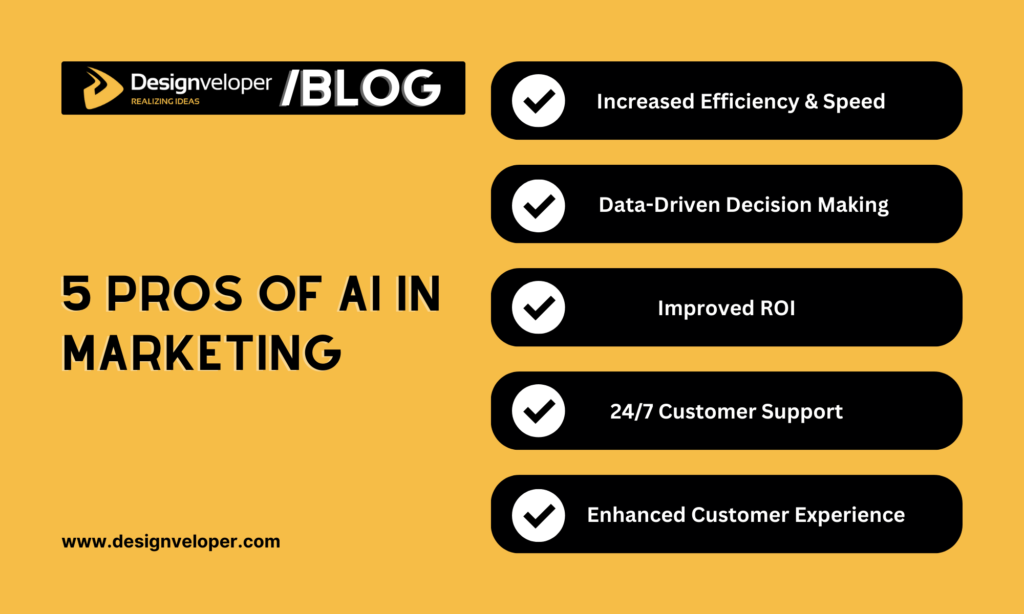
During years of working with AI in marketing, we realized AI gives marketing executives some benefits as follows:
Increased Efficiency & Speed
42.2% of marketers believed that if AI is in charge of marketing operations, human marketers will have more time to focus on high-level strategic and creative initiatives. This will lead to a more efficient workflow.
Through advanced data analytics, AI marketing tools can automate repetitive tasks with high accuracy and speed. At Designveloper, for instance, we leverage AI to expedite the marketing process while ensuring its quality and our team’s productivity.
In particular, tools like Mailchimp help us analyze the behaviors of email recipients to optimize the email’s content and delivery time. Meanwhile, tools like BuzzSumo and GPT-4o can explore hot topics on social media, then suggest ideas and support us in creating high-quality content for these topics.
Data-Driven Decision Making
AI can’t replace human marketers in operational and strategic decision-making. But it plays a crucial role in assisting your to make informed decisions by offering data-driven insights.
For example, AI-powered tools like Marketo or Salesforce Einstein sifts through vast amounts of data to generate actionable insights into customer behavior, campaign performance, and market trends. These tools can present these insights in visual formats (e.g., dashboards and interactive reports), hence enabling us to make data-driven decisions and optimize campaigns for better outcomes.
Improved ROI
By optimizing campaigns and targeting the right audience, AI can significantly enhance the return on investment (ROI) of your marketing efforts.
In particular, AI-generated insights give you a clearer picture of how effectively resources are allocated to campaigns through success metrics. These metrics can be clicks, conversions, cost per conversion, engagement, and customer behavior. Accordingly, you can adjust the marketing budget for more effective spending and achieve better results.
24/7 Customer Support
11.7% of human marketers today leverage AI-powered chatbots for customer service. Especially after the introduction of ChatGPT in late 2022, chatbots have been upgraded to an innovative and intelligent level.
This forward not only improves the conversational abilities of chatbots but also expands their applications across other industries. Accordingly, they can be available 24/7 to provide customized responses, handle common issues promptly, and even predict user needs.
If you want to build a proprietary chatbot that works across channels (e.g., websites or social networking sites), contact Designveloper and share your idea! Our experience with AI & chatbot development helps you create a smart assistant for 24/7 customer support.
Enhanced Customer Experience
Through advanced data analytics, AI can personalize the customer journey by creating custom content, offers, and recommendations to their preferences and needs.
Such AI-powered tools as Hotjar and Crazy Egg, for example, are widely used to track customer behaviors across our channels. They then suggest optimal solutions to enhance user experience and marketing campaigns.
This can lead to higher engagement and conversions. Further, it boosts brand loyalty and navigates leads down to the sales funnel with ease.
5 Cons of AI in Marketing
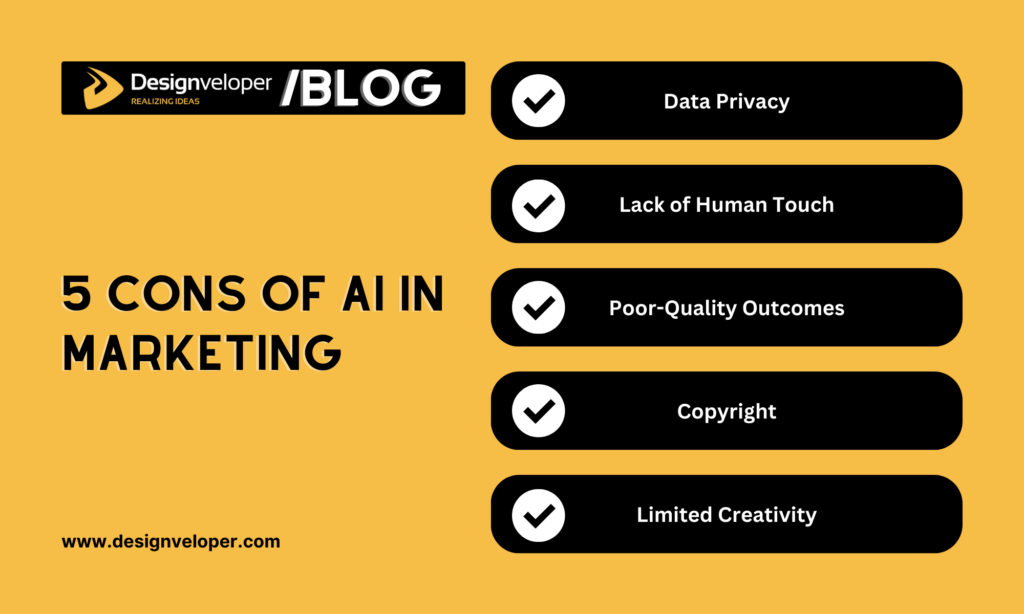
Despite its immense benefits, AI is not without its challenges. Here are some drawbacks you should consider when adopting AI in marketing operations:
Data Privacy Concerns
AI depends heavily on your business and customer data to generate insights or recommendations. This raises concerns about data privacy and security, especially in sectors where data is sensitive like finance or healthcare.
Therefore, your marketing team needs to prioritize data transparency and obtain user consent before using data for analytics. Further, we advise you to apply strict security measures such as data encryption, periodic security system checks, and compliance with data security regulations like the AI Bill of Rights. This helps you gain customer trust for transparent data practices and avoid penalties.
Lack of Human Touch
Effective marketing goes beyond mere advertising. It resonates with target audiences on a deep emotional level and positions your business as a trusted partner in their journey. AI excels at automation and data analytics, but it may struggle with creating a human touch in customer interactions and marketing messages.
Therefore, adding human interactions is crucial to engage customers emotionally and forge genuine connections. However, not all employees know how to leverage AI for effective marketing efforts. To solve this problem, we at Designveloper often organize training sessions, highlight AI’s benefits in marketing, and encourage members to leverage AI in their daily marketing tasks.
Poor-Quality Outcomes
AI can produce biased or accurate outcomes if their training data also contains these biases or errors. This can lead to discriminatory marketing practices and campaign failures.
However, while data is crucial for AI, it’s not the only factor affecting its accuracy. Google indicated three other important aspects (algorithms, hardware, and human talent) play a role in the quality of AI’s output. Further, data itself can be unsurprisingly flawed. So we recommend using cross-validation methods to double-check AI-generated information before using it.
Copyrights Concerns
AI systems are trained on vast amounts of data collected from various sources. This data, however, can contain copyrighted material. As AI builds on this data to generate new content, there’s a potential for copyright infringement, especially when handling creative outcomes like artwork.
Therefore, your business needs to ensure the ethical use of AI by complying with copyright laws. Also, you should validate outcomes or execute safeguards to prevent AI-produced content from violating any existing rights.
Limited Creativity
While AI can be helpful for content creation, it may struggle with tasks requiring high levels of creativity such as writing emotionally resonant messages or designing original concepts. In another case, depending too much on AI in content generation can reduce our creativity.
Therefore, you can use AI to streamline part of content production while preserving your creative traits and maintaining human oversight for the creative spark.
AI Marketing Advancements & Trends
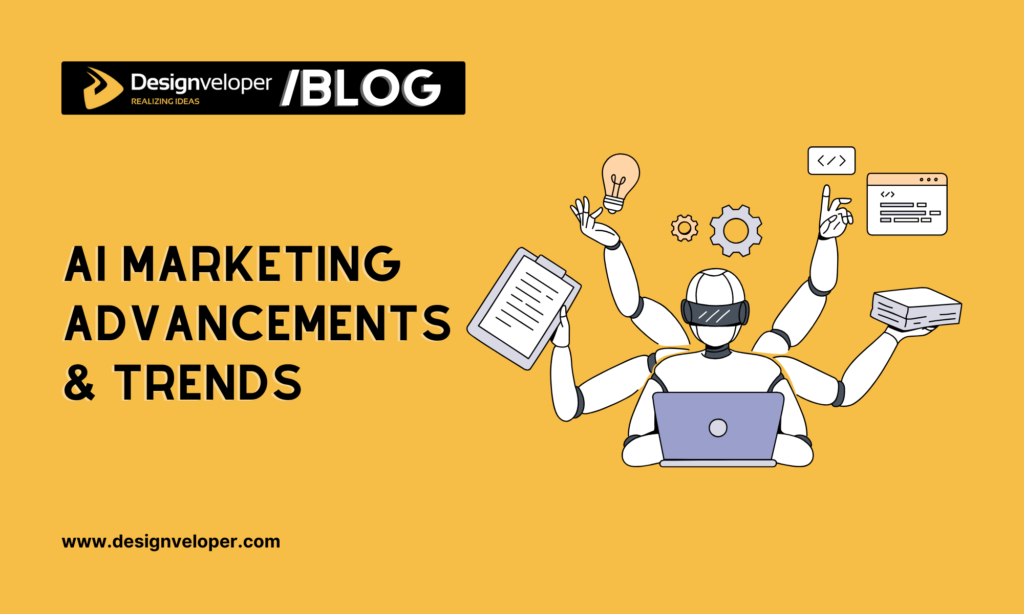
The global market of AI in marketing is thriving, from a staggering volume of USD 12.5 billion in 2022 to a projected revenue of USD 72.1 billion by 2030. This growth is equivalent to 24.5% during the forecast period. Along with this rapid advancement, we’ll witness the following innovations and trends that are shaping the future of AI in marketing.
Generative AI
ChatGPT’s arrival has sparked a surge in interest for generative A, propelling the technology to the forefront of public conversation. GenAI is transforming marketing by creating a diverse range of high-quality content, from realistic images to personalized copywriting and engaging videos.
Accordingly, you can leverage this powerful tech to customize campaigns, develop dynamic ad creatives, and create content that resonates with specific customer groups. With its massive benefits, GenAI is increasingly adopted in marketing with an impressive CAGR of 28.6% from 2023 to 2033.
Conversational AI and Chatbots
The capabilities of chatbots are advancing rapidly thanks to advancements in conversational AI. The AI model uses advanced techs like natural language processing (NLP) to understand, process, and respond to human language. This allows conversational AI to have more engaging and natural conversations with users.
When conversational AI becomes more sophisticated, chatbots can engage in more meaningful and emotionally intelligent dialogues with users. This can significantly improve user experience and conversions.
Predictive Analytics
In a fierce competition, predictive analytics help you better understand customer behaviors, marketing trends, and more.
The use of predictive analytics in marketing is expected to grow, with AI analyzing historical data and purchase patterns to provide accurate predictions. This allows you to personalize and deliver marketing campaigns, messages, and offerings that fit your target audience.
Voice-Based Shopping and Multimodal AI
The global transaction value of voice-based purchases is expected to reach USD 164 billion by 2025, a staggering 630% rise since 2020. With the continued adoption of voice assistants, voice-based shopping is becoming popular. You may leverage this convenience by optimizing their content and products for voice search.
Further, multimodal AI, which combines various forms of media (e.g., text and images), is improving the shopping experience. It does that by offering your customers more immersive ways to interact with your business.
Ethical Considerations
As AI becomes more integrated into marketing, ethical considerations will play a crucial role. Accordingly, you need to balance AI usage with adhering to privacy regulations and maintaining customer trust.
10 Best AI Marketing Tools
Recently, we’ve seen a soar in powerful tools that integrate these advancements and trends. These AI-powered platforms empower you to automate various marketing activities, such as content creation, SEO, digital advertising, or sales support.
To illustrate the power of AI in action, let’s discover five key areas where AI is revolutionizing marketing, along with 10 outstanding tools available in 2025.
Content Creation & Optimization
Most marketers (44.4%) have adopted AI to produce various kinds of data-specific content, from blog articles and email newsletters to graphics.
Using Natural Language Generation (NLG), AI can create and personalize user-generated content (UGC) to fit your target audience and specific campaigns. For this reason, it takes personalization in marketing to new heights. Besides, it can optimize the content for search engines and provide valuable insights into content performance.
There are many AI-powered tools for content creation and SEO. Here are two prominent candidates:
Jasper.ai
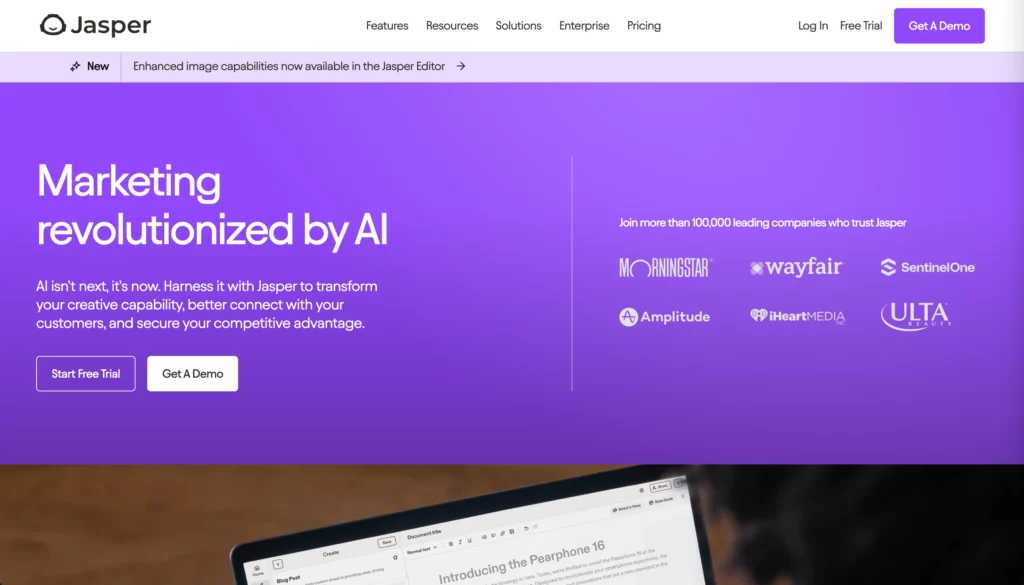
Jasper.ai is an AI-powered writing tool that uses advanced machine learning algorithms to create SEO-based, high-quality content that resonates with your audience. This AI marketing tool accordingly supports you in blog writing, copywriting, SEO, content strategy, integrated marketing campaigns, and social media marketing.
The tool offers the Jasper AI Copilot to help your marketing team achieve better and faster outcomes. Here’s what it can do:
- Company Knowledge: Jasper acts as a central hub for key information about your company, audience, products, and more. Accordingly, it can securely access this knowledge base and learn your brand’s distinctive writing style and tone to ensure all content reflects your brand identity.
- Team Acceleration: Jasper manages content creation tasks and tracks progress visually with Kanban or Calendar views. Also, it automates repetitive tasks (e.g., formatting) and allows members to collaborate directly on the Jasper editor.
- Content Generation: Jasper creates images from your single prompts to support your text content. Further, it can convert your content or brief into multi-channel campaigns.
- Analytics: Jasper visualizes your content performance and gives automated recommendations to improve the worst. It may automatically convert your existing content into high-quality improvements.
All these AI capabilities are built in alignment with certified security methods and regulations (e.g., GDPR Compliant).
Copy.ai
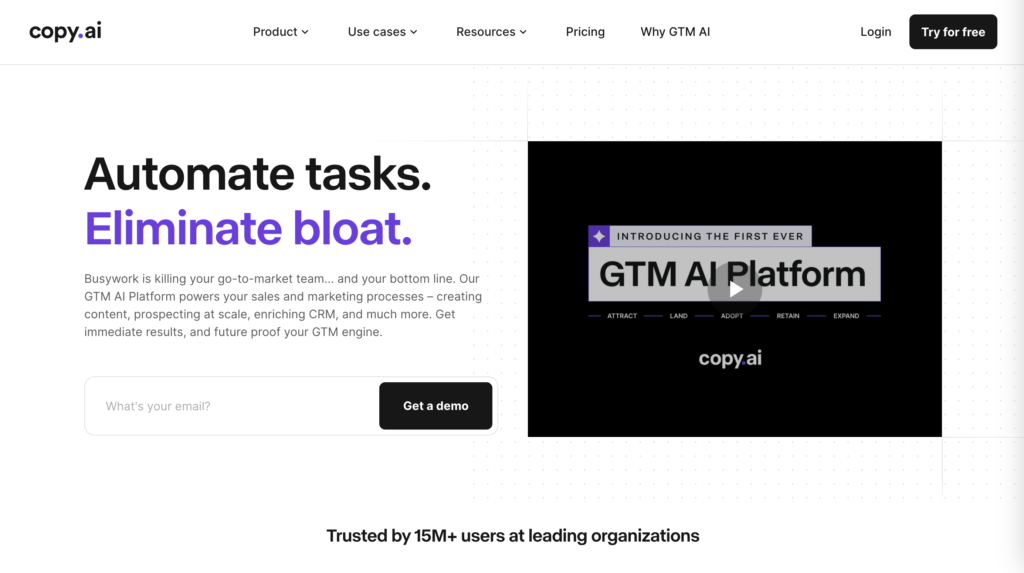
Copy.ai is a powerful GTM (go-to-market) platform. This tool uses AI to automate marketing & sales tasks, improve CRM (customer relationship management), and speed up time to market. Accordingly, the platform helps you in various activities, from SEO content generation and translation to personalized prospecting and competitor analysis.
Below is some of what Copy.ai’s AI features can do:
- Workflow Generation: Copy.ai automatically builds workflows with high-impact actions based on pre-made templates. These workflows can be creating LinkedIn post creation, Facebook ad copies, FAQs, and more.
- Brand Voice: The tool enables you to generate content that reflects your brand’s unique style, tone, and more.
- Infobase: This feature allows you to securely store all key information like your value propositions or brand guidelines. This data is useful for Copy.ai to create content relevant to your business.
- Content Creation: Copy.ai integrates a diverse range of AI tools to generate the content you need. This content can be social media captions, marketing emails, product descriptions, website CTAs (call-to-actions), and more.
Social Media Management
The global market for AI in social media management is projected to increase at a CAGR of 28.04% within five years (2024-2029). This is not surprising as AI is increasingly becoming a game-changer for managing your social media presence and automating tasks. Here are some of the top AI marketing tools that enhance your brand awareness on social media:
Hootsuite
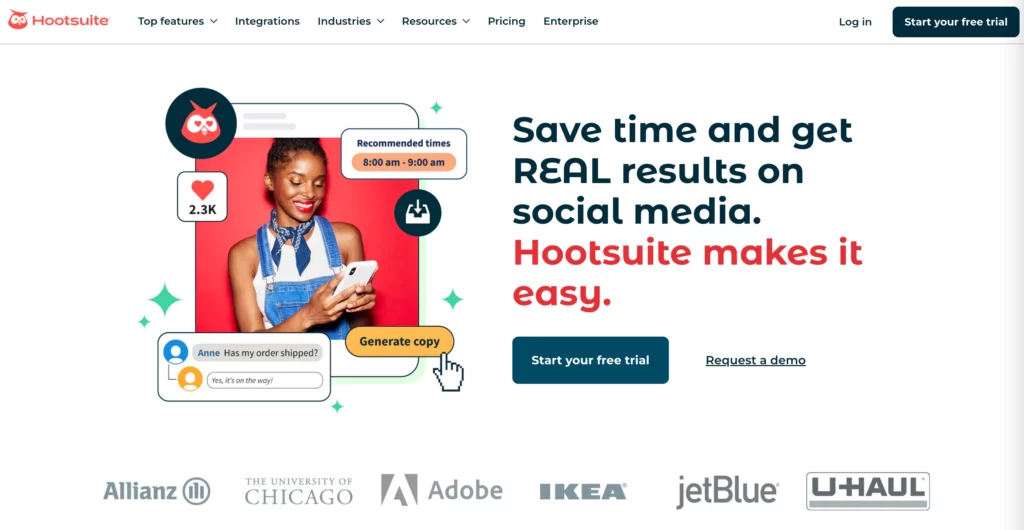
Hootsuite is a widely recognized platform that integrates AI capabilities to streamline your social media management. From curating content and social listening to scheduling posts and measuring ROI, Hootsuite serves as a central hub for social managers to handle.
This AI marketing tool offers the following core features to help you stay competitive on social media:
- Analytics: Hootsuite connects all your networks for analytics, be it LinkedIn, Pinterest, or Facebook. Accordingly, it can visualize the top-performing campaigns through such metrics as conversions, compare with your industry competitors, and find the best posting time to achieve your goals. Also, Hootsuite Analytics allows you to track your spending and ROI on each channel or post.
- Owly Writer AI: This chatbot helps you generate social media ideas, posts, captions, and hashtags in your favorite writing style. Also, it can repurpose highly performing content into other forms (like videos or infographics).
- Social Advertising: Hootsuite enables you to generate and launch all social media posts in one place by connecting with all your existing marketing tools (e.g., HubSpot or Mailchimp). Besides, the AI-powered function, Hootsuite Boost, discovers your top-performing posts to turn into adverts.
- Social Listening: The platform integrates Talkwalker (known social listening software) and BlueSilk™ AI to help you manage online conversations across channels. Plus, it supports you in understanding customer behavior, identifying brand sentiment, and predicting new trends.
Brandwatch
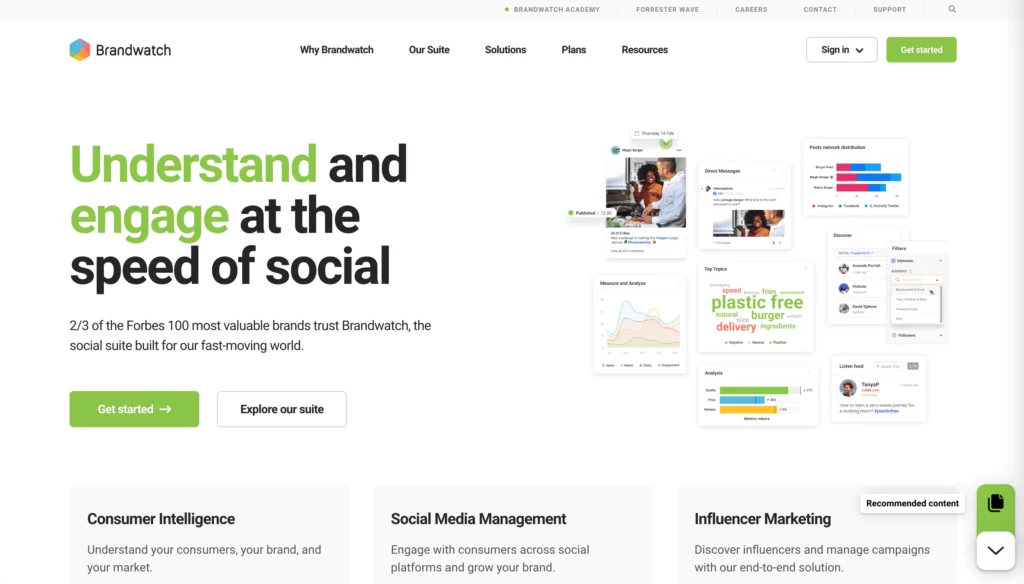
Brandwatch is a comprehensive enterprise solution for digital marketing. From market research and customer care to social media management, Brandwatch helps you achieve better results, avoid cyber threats, and better engage with target customers.
With Brandwatch’s Social Media Management platform, you can:
- Monitor all social activities and accounts across channels, teams, and regions in one place.
- Schedule, edit, review, and launch your content on multiple networks with a unified content calendar.
- Monitor and automate conversations across channels in one customizable social inbox to maintain a consistent brand voice.
- Research and devise strategies with the social listening function to attract and grow your customer base.
- Measure and visualize your cross-channel performance with customizable dashboards.
- Compare your performance against industry peers, seek trending content, and better comprehend your share of voice.
Besides, the platform uses Iris AI to search for online conversations to analyze overall volumes of certain keywords and discover popular insights. Also, it can automate content generation and performance analytics.
Email Marketing
Even in the age of social media, email marketing still remains a powerful tool for nurturing leads, boosting conversions, and building customer loyalty. Accordingly, email marketing is the top area where marketers currently use automation and AI (63%). With the assistance of AI, you can automate tasks, customize content, and optimize campaigns. Here, we’ll delve into two leading platforms in this realm:
SendGrid
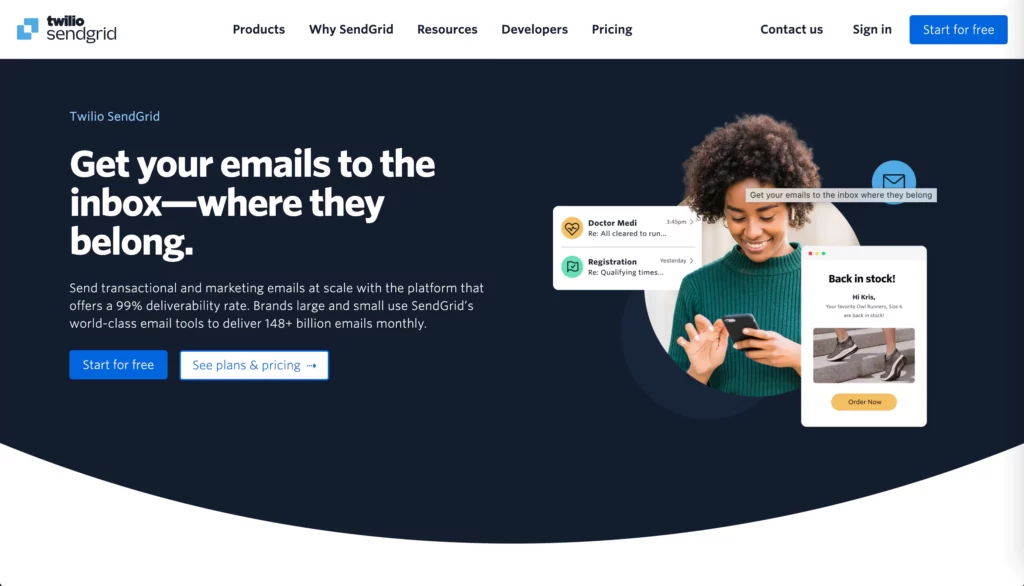
SendGrid is a leading email marketing platform that offers end-to-end services for your successful campaigns. It provides a wide range of core capabilities, including AI, to facilitate your email marketing journey from design to deliverables:
- Email Design: You can design a professional email by using a drag-and-drop interface, choosing from an extensive library of available templates, or modifying HTML.
- Email Testing: This feature allows you to anticipate the potential issues of your emails before sending them. Particularly, it can assess your email’s spam score, check the email’s look across devices, and validate all links embedded.
- Marketing Automation: SendGrid enables you to automatically send emails at specific times. Also, it allows you to track emails through metrics like unique opens, unique clicks, or unsubscribes.
- Email Statistics: This feature lets you track and analyze your campaign performance. Accordingly, you can evaluate delivery and engagement metrics, compare all your campaigns, and gain deep insights into your subscriber base.
- Adaptive Communication Engine (ACE): This AI tech tailors your email marketing strategy to your specific needs. It also considers global email trends to improve deliverability. Further ACE integrates the Neural Protection function to detect and solve potential issues with your email delivery habits.
In addition to these functions, its Email API allows developers to incorporate email-sending features into your existing software.
Mailchimp
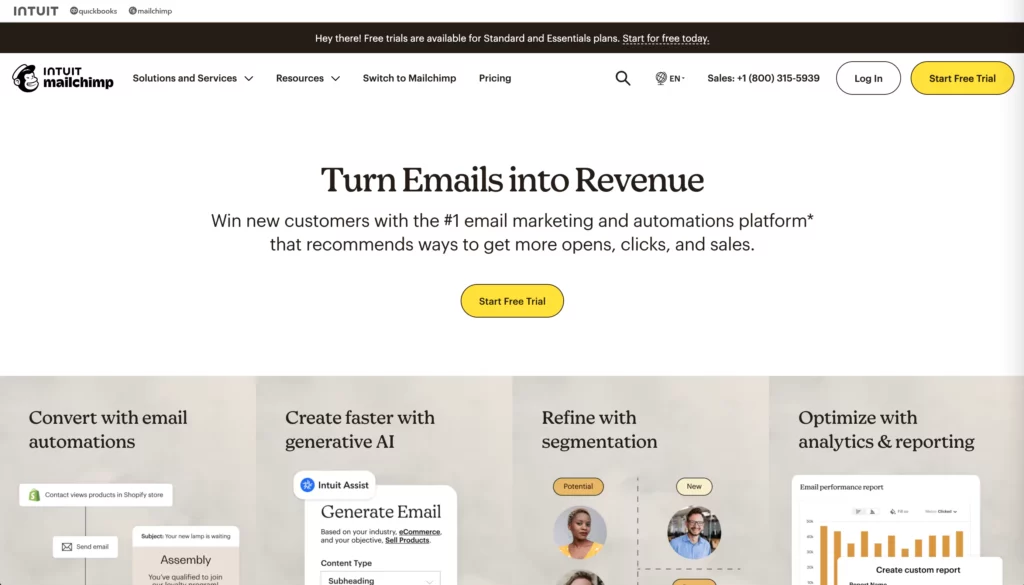
Mailchimp is among the best AI-powered email marketing platforms. It provides essential functionalities for marketing automation, from content generation and reporting to email and social media management.
In terms of email marketing, Mailchimp’s AI and automation tools like Intuit Assist can help you with the following tasks:
- Write quick content like body copies or headlines.
- Design branded content (e.g., professional logos and other assets) to engage a target audience with your brand.
- Craft professional-looking email templates with the drag-and-drop function.
- Segment customers for timely communication and the right email campaigns.
- Send customized emails with automated product recommendations based on your customer’s past behaviors.
- Track and analyze your campaign performance through key metrics and real-time reporting, omni-channel dashboards, and more.
Digital Advertising
The competitive playground of digital advertising requires creative innovation and constant optimization. AI is transforming this realm by automating tasks and delivering highly targeted ad campaigns to the right audience at the right time. Below are two outstanding AI-powered digital advertising tools:
Hyros
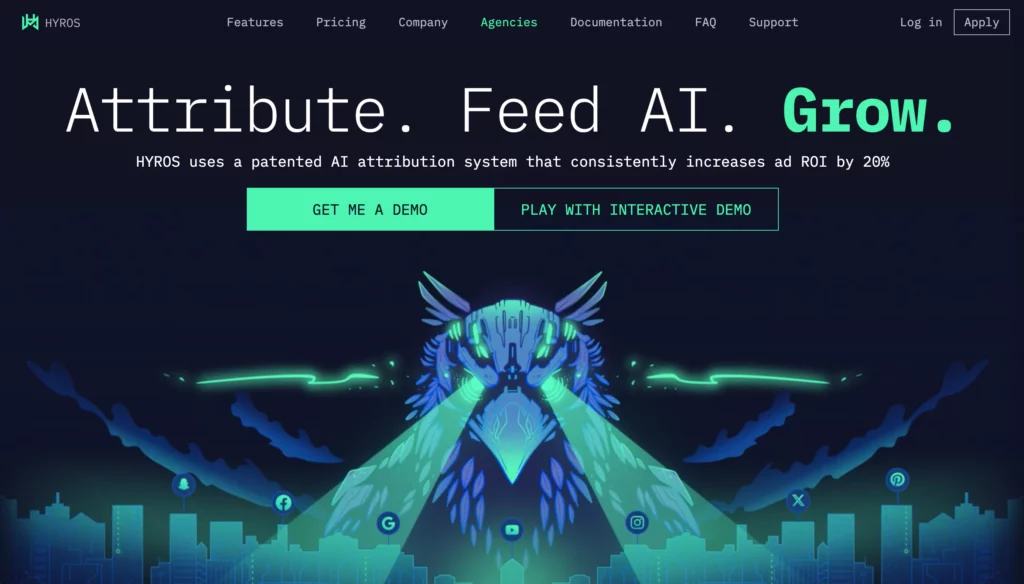
Hyros is premier software that leverages AI tracking technologies to continuously increase ad ROI while minimizing ad spending across various channels. This AI marketing tool is widely adopted in different sectors, including eCommerce, organic traffic, sales call funnels, info marketing, SaaS, and more.
Accordingly, Hyros provides core features as follows:
- Customized Dashboard: This feature allows you to tailor a dashboard for visualizing key metrics (e.g., leads, sales, calls, and returning customers) or conducting data analytics. Besides, you can drag, drop, and refine everything in the dashboard to showcase your desired statistics and metrics.
- Ad Attribution: This AI-powered system helps identify which ads are effectively generating conversions and sales. As such, it allows you to track and analyze ad performance across various channels in one place. This enables you to modify bidding strategies and budget allocation to increase ad ROI.
- Call Monitoring: Hyros helps you track and analyze the performance of sales calls. This gives you a comprehensive view of the customer journey and finds ways to optimize call funnels. Further, it uses a watcher code and scheduling software to track calls efficiently. Then, it provides meaningful insights into the influence of these calls.
- Customer Segmentation: Hyros uses AI for better targeting ads to the right customers. This helps increase customer experience and ad profitability.
AdCreative.ai
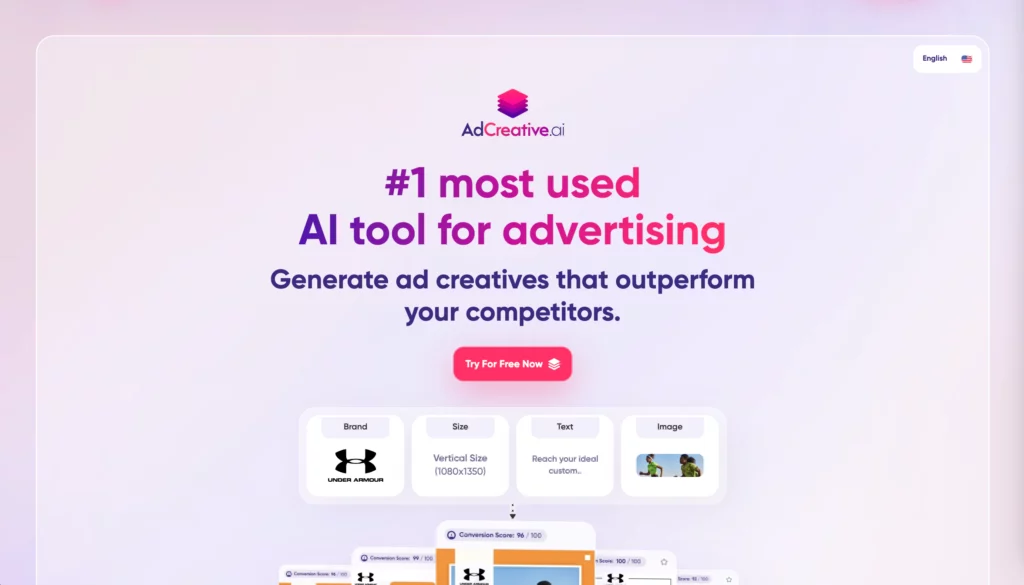
AdCreative.ai is a comprehensive tool that uses AI to build visual and text-based creatives for your cross-channel ads. This tool works by training its machine learning model on creatives collected from reputable displays and social platforms.
Here are some of its key features that turn AdCreative.ai into a centralized powerhouse for end-to-end advertising:
- Creatives & Texts Generation: The tool can generate a multitude of professionally designed ad creatives, texts, and headlines that drive conversions and match your brand identity. Further, these ad assets are modified in size and color to fit your ad platforms and audience.
- Creative Insights: By connecting your ad accounts with AdCreative.ai, you can gain deep insights into your ad creatives across channels (e.g., Facebook or LinkedIn). Besides, this function analyzes your ad creatives, pinpoints where to improve, and gives suitable recommendations based on your budget and audience.
- Competitor Ads: AdCreative.ai can unleash and analyze the top-performing ads of your competitors across channels. Then, you can get a deep look at their traffic sources, international reach, buyer demographics, and other metrics (e.g., visit counts).
- Complete Ad Package: AdCreative.ai enables AI to scan and analyze your entire website to understand your products and others. It then tailors advertising strategies and creatives. Accordingly, you can choose from the tool’s available strategies (e.g., influencer partnerships and giveaways) and customize a strategy.
Predictive Analytics
The future of marketing is propelled by data and the ability to predict customer behavior. Today, the introduction of AI, especially GenAI, empowers you to sift through massive data and discover hidden patterns. This allows you to make data-driven decisions and optimize campaigns for future success. Now, we’ll explore two outstanding tools that leverage AI for powerful predictive analytics:
Alteryx
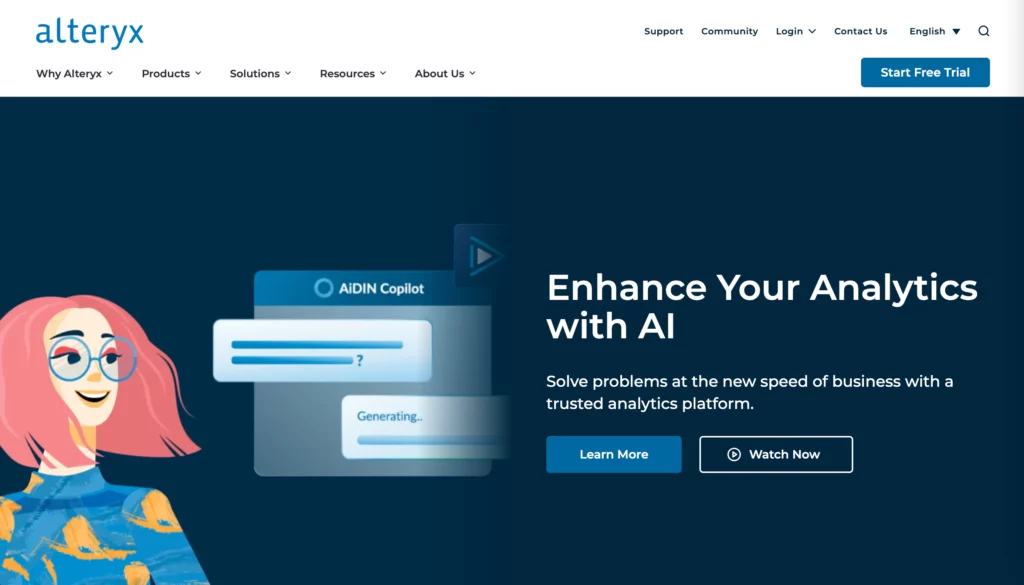
Alteryx, Inc. is a leading tool that integrates AI capabilities to streamline data preparation, analytics, and predictive modeling. This platform allows you to foster analytics maturity, make better decisions, and achieve higher outcomes.
Below are some of Alteryx’s outstanding capabilities:
- Designer Cloud: This modern solution helps transform your data by integrating various data sources into a centralized hub. Accordingly, the platform allows you to drag and drop elements to generate your data workflows. Besides, it gives AI-backed recommendations to make the data transformation process faster and more effective.
- Data Prep and Enrichment: The drag-and-drop interface and generative AI create and accelerate your data analytics process. Further, Alteryx’s low-code tools empower you to dive deep into patterns and uncover insights from different sources.
- Alteryx AiDIN: This AI-powered functionality can create content, scenarios, recommendations, and predictions that support your crucial decisions. Besides, it helps you discover innovative patterns in your datasets, automate repetitive analytical tasks, and ensure data transparency. It also improves data analytics with such new features as location intelligence or geospatial.
- Auto Insights: This feature uses machine learning algorithms to discover what happened to your data (e.g., why your key metrics are declining over time) and unleash patterns or trends. Then, it’ll leverage natural language generation (NLG) to explain business results in intuitive visualizations.
Qlik
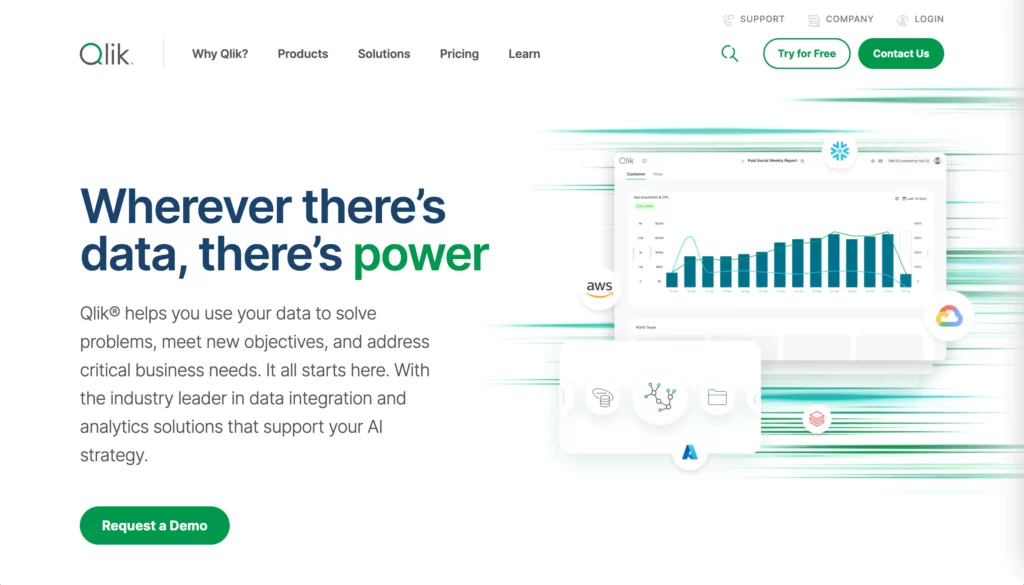
Qlik is a prominent business intelligent software that uses AI to provide data visualizations and explore predictive insights for data-driven decisions. The platform solves all your data challenges by following a well-structured process, from integrating, transforming, and governing data to analyzing and acting on data.
Qlik provides three main services around data analytics and business intelligence:
- Talend® Data Integration & Quality: With core capabilities like Data Streaming or Data Lake Creation, this feature enables you to connect all data sources and send data to any destination in real time. Further, it can improve data and automatically fix errors in data while protecting data privacy and security.
- Analytics: Qlik Analytics offers a wide range of features like embedded analytics, augmented analytics, visualizations, and reporting. With AI-powered insights, you can conduct more accurate predictive analytics and take more intelligent actions.
- AI/ML: Qlik integrates AI capabilities like AutoML, Qlik Staige, or Qlik Answers to make data analytics accessible to everyone. Accordingly, you can build machine learning models, analyze data, run experiments, and launch results. Besides, you can get personalized answers and get reliable insights.
Conclusion
After this article, you may understand how AI is deployed in multiple marketing aspects, including content creation & SEO, social media management, email marketing, and predictive analytics. Despite its immense advantages, AI still poses some threats to your marketing effort. Therefore, you need to devise a strategy to leverage AI’s strengths while minimizing its potential risks. For more interesting topics of AI marketing, subscribe to our blog!



































